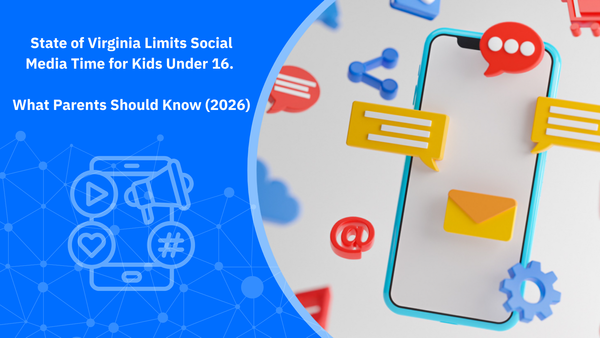Don't Let Your Child Lie About Their Age in Games. Here's Why.

As a parent, you likely see your child immersed in colorful, engaging mobile games every day. While these games may seem harmless, there's a hidden risk many don't realize—advertisers quietly collecting data and building detailed profiles on your child, even if they're under 13 and supposedly protected by privacy laws.
How Kids Are Profiled Through Mobile Games—3 Ways Advertisers Collect Their Data
Many mobile games appeal to players of all ages, which makes it challenging to determine if privacy protections for children should be applied. Regardless of whether kids are playing intentionally or by accident, advertisers frequently find ways to collect their data. Here are three methods through which this occurs:
1. Games Without Clear Age Limits
Some games appeal to both children and adults, making it tricky to enforce privacy laws. A well-known example is SpongeBob: Krusty Cook-Off, which faced scrutiny from the Children's Advertising Review Unit (CARU). While the game was enjoyed by kids, it lacked proper age verification, potentially violating the Children's Online Privacy Protection Act (COPPA). This meant personal data from players under 13 could have been collected without parental consent.
2. Games That Hide Age Restrictions in Fine Print
Some developers avoid privacy regulations by quietly stating in their policies that their games are meant for older players—despite being designed in ways that clearly attract children. This loophole allows them to legally collect data from young players, building detailed profiles based on their gameplay habits, interests, and in-game behaviors. Since most parents rely on app store ratings instead of digging through privacy policies, kids often end up playing games that gather their data without parental knowledge.
3. When Kids Lie About Their Age
The third way kids get profiled is by entering an older age to access a game. Many games ask for a birthdate at sign-up, but there's often nothing stopping a child from claiming they are 13 or older.
When this happens, the game treats them as an adult user, meaning their personal data can be legally collected, shared, and used for targeted advertising.
In this case, the child (and their family, knowingly or unknowingly) has technically given consent, leaving advertisers free to track their online behavior.
What Data Are Games Collecting, and Why?
When your child plays a mobile game, various types of data may be collected—often without your knowledge. This can include:
- Location – Some games track your child's location in real time. This information can be used for location-based advertising, but if shared or leaked, it could pose safety risks.
- Device and Advertising IDs – Unique identifiers linked to your child's device allow advertisers to track their gaming habits across different apps and websites, even after they stop playing a particular game.
- Gameplay Activity – Games monitor when, how often, and how long your child plays. This helps developers optimize engagement but also allows advertisers to learn about their routines and preferences.
- Personal Info & Messages – Some games encourage kids to create accounts, join chats, or interact with in-game characters. These interactions may be logged, analyzed, and used to refine advertising strategies or even sold to third parties.
The Hidden Dangers of Data Collection in Kids’ Games
When advertisers collect data on your child, they’re not just serving up random ads—they’re shaping what your child sees, wants, and even how they think. The more tailored the ads, the more they influence your child’s preferences, spending habits, and even self-esteem. Without realizing it, kids can become attached to specific brands, develop impulsive buying behaviors, or feel pressured to keep up with trends pushed by advertisers.
But the risks go beyond just ads. The more personal data companies collect, the greater the chance it could fall into the wrong hands. If this information gets leaked, sold, or misused, your child’s location, habits, and digital footprint could end up accessible to hackers, scammers, or even online predators.
Related: How to Explain Data Breaches to Kids and Protect Them against Identity Theft
How Parents Can Protect Their Child's Privacy
Many parents believe that age ratings in app stores reflect both content suitability and privacy protections, but this is not always accurate. Here are the steps parents should take:
1. Don't Let Your Child Lie About Their Age in Games
When game companies are aware that their players include children under 13, they must comply with regulations like COPPA (Children's Online Privacy Protection Act). COPPA ensures parents have a say about the personal information companies collect from young children online, including through mobile games.
If a game, app, or online service is meant for children or knowingly has users under 13, the company must:
- Clearly inform parents about how their child's information will be used.
- Obtain verifiable parental consent before gathering, using, or sharing the child's personal data.
- Provide a way for parents to review and request the removal of their child's information.
Additionally, COPPA prohibits companies from requiring children to share more data than is absolutely necessary to play a game. As a parent, you have the right to request deletion of your child's data at any time.
But to benefit from these privacy protections, you must make sure they enter their real age when signing up for new games.
Related: Online Gaming Safety for Kids – Essential Tips for Parents
2. Check Privacy Policies Before Downloading
Don't rely on app store ratings alone. Take a few minutes to review the game's privacy policy, especially looking for:
- The age restrictions (which may differ from the app store rating).
- What data is collected and whether it is shared with third parties.
- Whether parental consent is required for younger users.
3. Keep an Eye on the Games Your Child Plays
Take a moment now and then to check what games your child is playing. If you come across one that doesn’t seem safe or collects too much personal data, consider removing it. Also, make sure privacy settings are still in place—some apps update and reset settings without notice.
A parental control tool like Bitdefender Parental Control can help. It lets you see which games your child is using, set healthy internet time limits, and make sure they aren’t unknowingly sharing personal information.
4. Talk to Your Child About Online Privacy
Explain why it's important to be honest about their age online and how companies collect data. Encourage them to ask before downloading new games and remind them to be cautious about sharing personal information in chat features or in-game accounts.
Related: How to Talk About Digital Privacy with Kids
FAQs
How can I tell if a mobile game is collecting my child's personal data?
Check the game's privacy policy rather than relying solely on the age rating provided by app stores. Look specifically for details about data collection practices, age restrictions, and third-party sharing.
Why are privacy policies and age ratings sometimes different in app stores?
App store age ratings typically evaluate game content (such as violence or language), not privacy issues. Privacy policies reveal the actual intended user age and explain what information the game collects. This discrepancy can lead to confusion among parents.
How can I protect my child's privacy on mobile devices?
Use parental control solutions like Bitdefender Parental Control, regularly review privacy settings, disable ad tracking, and openly discuss online safety with your child.
What data do mobile games collect from children?
Mobile games often collect data such as your child's location, device information, unique advertising IDs, gameplay habits, and in-game behaviors. This data can be used by advertisers to build detailed profiles, targeting ads directly to your child's interests and preferences.
tags
Author
Cristina Popov is a Denmark-based content creator and small business owner who has been writing for Bitdefender since 2017, making cybersecurity feel more human and less overwhelming.
View all postsRight now Top posts
How Do You Manage Your Passwords? We Ask Netizens
December 18, 2025
Cybercriminals Use Fake Leonardo DiCaprio Film Torrent to Spread Agent Tesla Malware
December 11, 2025
FOLLOW US ON SOCIAL MEDIA
You might also like
Bookmarks









